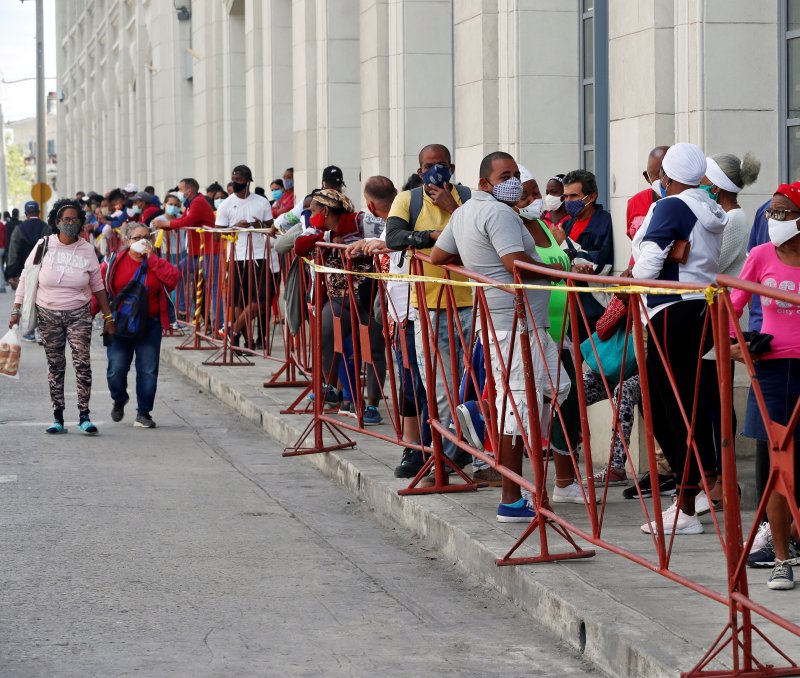People wearing masks line up to buy food in a market in Havana, Cuba, amid spike in pandemic earlier this month. File Photo by Ernesto Mastruscusa/EPA-EFE
Feb. 6 (UPI) -- Cuba has imposed a curfew amid a surge in COVID-19 cases in Caribbean nation.
The country reported 12,225 confirmed cases and 146 deaths from the pandemic in 2020, but since the beginning of 2021, it has nearly tripled its number of cases -- 31,190 -- and almost doubled its number of deaths -- 229 -- according to Johns Hopkins University global tracker.
On average, Cuba has reported around 900 confirmed cases per day this month with over a third of the cases in Havana. Earlier this month the country reported a record high of 1,044 new daily cases.
Due to the spike, the Havana Tribune reported that a curfew will be imposed from 9 p.m. to 5 a.m. from Friday night.
Authorities imposed other measures last month to curb COVID-19 spread, including closing schools and restricting transportation.
Cuba will also a start a five-day quarantine Sunday for travelers entering the country.
Cuba aims to boost its tourism economy by curbing COVID-19 spread. It has a goal to produce 100 million doses to vaccinate its entire population this year and health authorities said tourists will be able to receive the vaccine shots during their stay. Development of the Sovereign II vaccine has advanced the furthest in Cuba and is expected to start Phase 3 testing in March and mass production in April.
On Saturday, Greece also implemented a weekend curfew to curb spread of the COVID-19 pandemic.
The government imposed the curfew from 6 p.m. until 5 a.m. on weekends in Attica, Thessalonika and Halkidiki along with allowing only pickup for retail after disagreement among the government's panel of experts. Furthermore, only essential businesses such as grocery stores, gas stations and pharmacies, will stay open and remote learning will continue for high schools.
Government experts had disagreed about keeping schools open during an 8-hour meeting Friday with one side arguing that schools reopening could increase COVID-19 cases and opponents arguing that schools needed to reopen for learning and psychological reasons.
A lockdown which closes hair salons similar to last March also took effect Saturday in Patra, Halkida, Agios Nickolaos, Mykonos and Santorini.
Also, as of Saturday, entering and leaving municipalities was only allowed for work purposes with construction activity suspended for the next five days.
On Friday, officials announced 1,195 new COVID-19 cases and 19 new COVID-19 deaths, bringing the total number of COVID-19 cases to 162,107 and the the total number of deaths to 5,922.
In Belgium, Prime Minister Alexander De Croo announced at a news conference Saturday the country was extending its lockdown to April 1 while some restrictions are eased.
Under the extended lockdown, bars and restaurants closed since last October will remain closed.
Still, some restrictions will be eased, allowing hair salons to reopen under strict conditions as of Feb. 13, and beauticians and tattoo artists to reopen from March 1.
"The coronavirus situation in our country has been fairly stable since the beginning of December, we have seen that hospital admissions are decreasing, and the number of deaths is decreasing, but on the other hand, we see that the number of confirmed infections remain approximately at the same level," De Croo said.
The prime minister added that the stability in cases was due to people following the COVID-19 rules.
Belgium has reported 721,432 cases and 21,295 deaths since the pandemic began, the global tracker shows.
In South Korea, health officials said the country would maintain current social distancing measures, including a ban on gathering of five or more people, through the Lunar New Year and until Feb. 14.
Some business opening hours may be adjusted due to economic hardships, South Korean Vice Health Minister Kang Do-tae said.
Prime Minister Chung Sye-kyun added that 580,000 businesses outside greater Seoul would open for an extra hour until 10 p.m. starting next week because "small business owners have reached their limit," not because COVID-19 is completely under control.
The measure impacts restaurants, gyms, karaoke rooms and cafes.
South Korea reported 393 new COVID-19 cases Friday and five new deaths, bringing the total death toll to 1,464.
To date, South Korea has reported 80,524 total COVID-19 cases, according to the global tracker.
Worldwide, COVID-19 has infected over 105 million people and left over 2.3 million dead, the same tracker shows.















